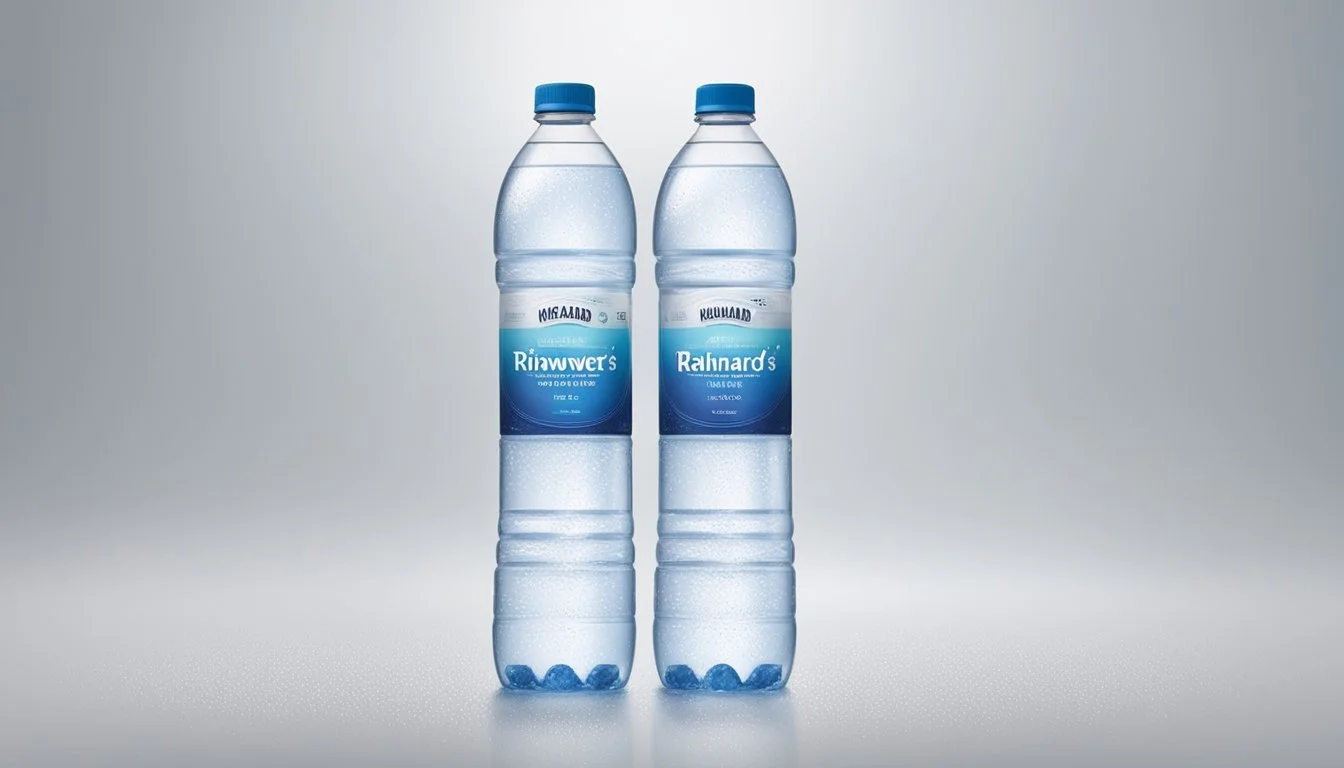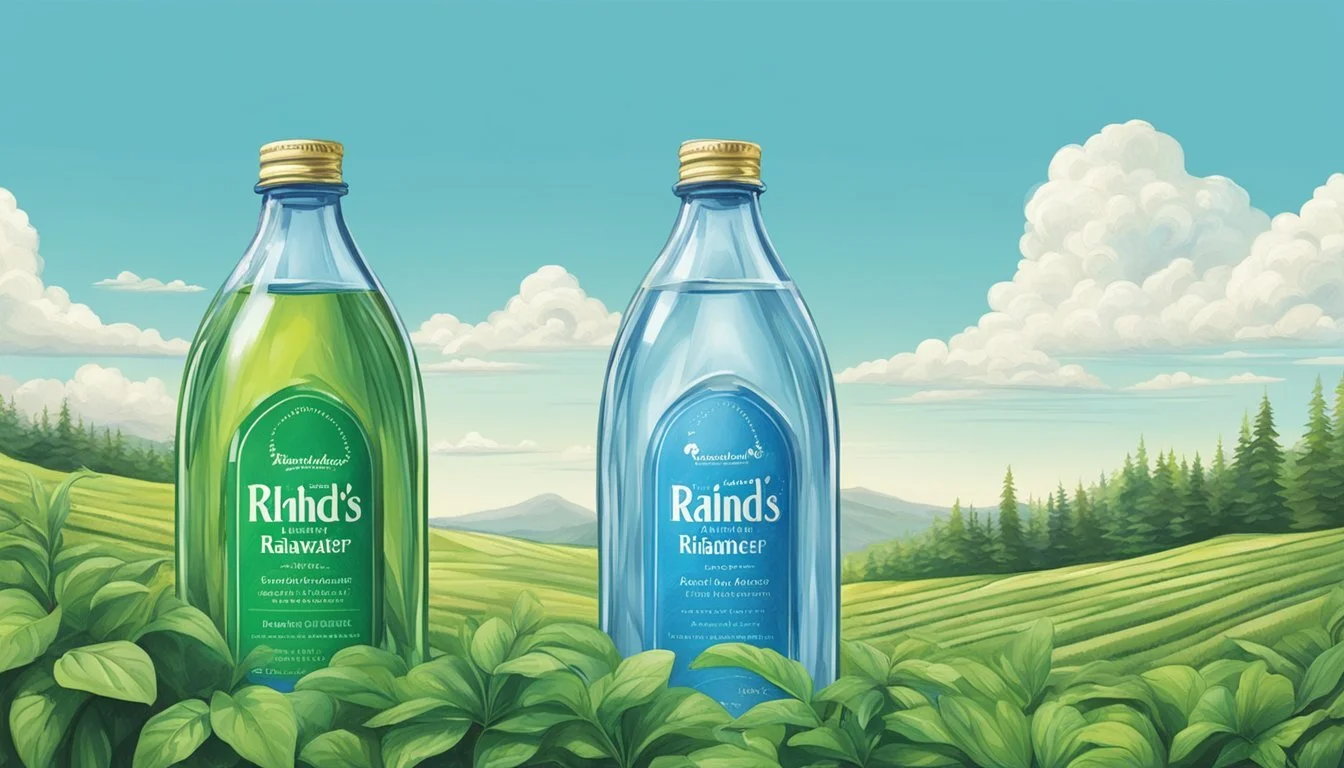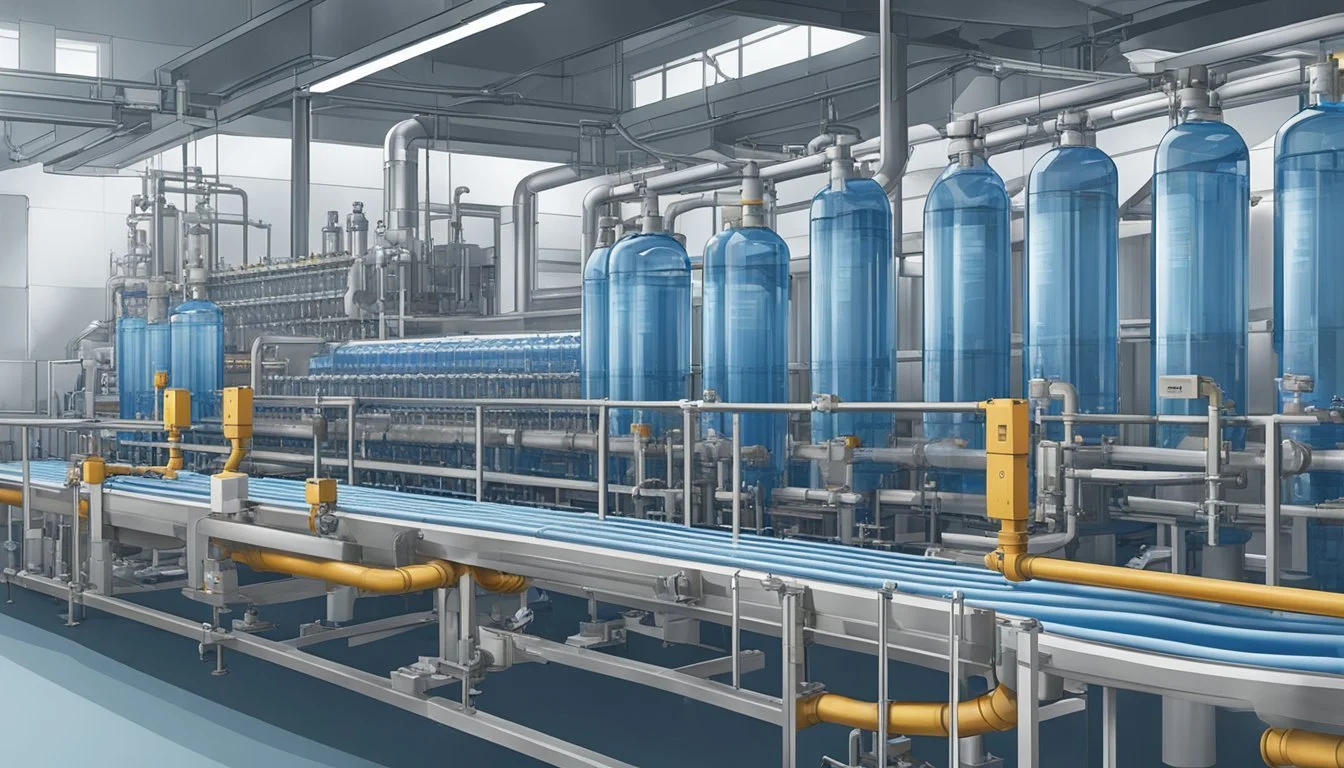Richard’s Rainwater vs. Kirkland Signature
Which Bottled Water Reigns Supreme?
When it comes to choosing bottled water, consumers often find themselves comparing various brands. Richard’s Rainwater and Kirkland Signature are two popular options that frequently come up in discussions. Understanding the differences between these brands helps make an informed decision about which one to buy.
Richard’s Rainwater is known for its unique harvesting process, where natural rainwater is collected, purified, and bottled. This method not only highlights an environmentally friendly approach but also ensures a fresh and clean taste. Kirkland Signature, on the other hand, offers a more standardized purified water experience, known for its affordability and widely accessible distribution.
For those prioritizing sustainability and a distinct taste from natural sources, Richard’s Rainwater stands out. However, Kirkland Signature appeals to those seeking a reliable and cost-effective option. Each brand serves its purpose, catering to different preferences and needs.
Evaluating Water Quality
The water quality of a bottled water brand depends on factors such as its source, purification methods, and taste. Richard's Rainwater and Kirkland Signature provide varied approaches to delivering clean, safe water.
Source and Collection
Richard's Rainwater is sourced from collected rainwater. This approach ensures that the water is inherently renewable and free from many contaminants found in groundwater or municipal water supplies. Collection sites are typically designed to maximize water purity and minimize environmental impact.
Kirkland Signature water, on the other hand, is sourced from multiple locations, including municipal water supplies and springs. Each source has different characteristics, and the water undergoes pre-filtration processes before final purification.
Filtration and Purification Processes
Richard's Rainwater employs a closed-loop filtration system to purify collected rainwater. This includes multiple stages of filtration, ensuring the removal of impurities and contaminants. The process avoids the use of chlorine, resulting in a more natural taste and fewer chemical residues.
Kirkland Signature uses a comprehensive purification process, which includes micro-filtration, reverse osmosis, and sometimes the addition of chlorine. This multi-step filtration guarantees that the water meets federal water standards, ensuring the removal of harmful substances such as PFAS and heavy metals.
Taste and Health Implications
Taste is a critical factor for many bottled water consumers. Richard's Rainwater delivers a clean, pure taste due to its rainwater source and chlorine-free filtration process. The absence of chemical additives enhances its refreshing quality.
Kirkland Signature water tends to have a more neutral taste, largely influenced by its varied sources and advanced filtration methods. It contains minimal fluoride and chlorine, aligning with health standards while providing a consistent taste profile.
Richard's Rainwater and Kirkland Signature each offer unique benefits in terms of water quality. While Richard's focuses on renewable resources and minimal processing, Kirkland provides a reliably neutral taste through rigorous filtration.
Environmental Considerations
When comparing the environmental impact of Richard's Rainwater and Kirkland Signature, it’s important to assess their sustainability practices and efforts in packaging and waste reduction.
Sustainability and Eco-Friendliness
Richard’s Rainwater positions itself as a sustainable alternative in the bottled water industry. The company collects and purifies rainwater, reducing dependency on traditional water sources. By using renewable rainwater, they help alleviate stress on local water networks and storm drains.
The brand aims to achieve a net-positive future, emphasizing water conservation and minimal carbon footprint. They actively promote initiatives to offset their carbon emissions and support zero-waste principles.
Kirkland Signature, a Costco brand, prioritizes cost-effectiveness which may sometimes overshadow their sustainability initiatives. While they adopt certain carbon footprint reduction strategies, their scale of operations poses challenges in fully embracing renewable resources and achieving a net-positive environmental impact.
Packaging and Waste Reduction
Packaging plays a crucial role in environmental sustainability. Richard’s Rainwater uses glass bottles and aluminum cans to package their products. These materials are more easily recyclable compared to plastic and help reduce overall waste.
Glass bottles offer a reusable option, and aluminum cans boast high recycling rates, complementing the brand's zero-waste goals. Richard’s Rainwater aims to minimize the environmental footprint by encouraging consumers to recycle and reuse their packaging.
Conversely, Kirkland Signature typically uses plastic bottles which contribute significantly to environmental waste. Although they employ various measures to recycle and reduce packaging waste, plastic remains a major environmental concern due to its less favorable recycling properties.
By comparing these two brands, it becomes evident that Richard’s Rainwater has a stronger focus on eco-friendly packaging and waste reduction, which can be critical for environmentally conscious consumers.
Market Presence and Availability
Richard's Rainwater and Kirkland Signature are two bottled water brands with distinct market presence and availability, appealing to different consumer bases through unique branding and distribution strategies.
Brand Recognition and Retailers
Richard's Rainwater has carved out a niche market, primarily targeting health-conscious consumers. It is prominently featured in Whole Foods and other specialty stores that emphasize organic and sustainable products.
Kirkland Signature, a private label of Costco, enjoys a broad market presence. It benefits from Costco's robust brand loyalty and extensive retail network. This brand is also available in Kroger and Albertsons, making it easier for consumers to access.
Sales and Consumer Preference
Richard's Rainwater appeals to a specific segment of the market interested in eco-friendly and premium products. Its sales are driven by distinct branding and a customer base that prioritizes purity and sustainability.
Kirkland Signature sees high sales volumes due to its competitive pricing and bulk purchase options. Its wide distribution network helps it dominate market share, making it a preferred choice for budget-conscious shoppers looking for reliable quality.
Product Variants
When comparing Richard’s Rainwater and Kirkland Signature, it is essential to look at both their still and sparkling water offerings. Each brand brings unique features to the table, catering to different preferences and use cases.
Comparing Still and Sparkling Options
Richard’s Rainwater offers both still and sparkling water variants. Their still water is collected from rain, ensuring a unique purity and taste. On the other hand, Sparkling Rainwater by Richard’s Rainwater is known for its refreshing bubbles and clean finish, making it a popular choice for those who prefer carbonated beverages.
Kirkland Signature primarily provides still bottled water. Produced by Niagara Bottling, Kirkland's still water is purified and packaged to meet high standards. While Kirkland doesn't offer a sparkling variant under its brand, its still water remains a cost-effective and popular choice among consumers.
These product variants cater to a wide range of preferences, from the unique rainwater offerings of Richard’s Rainwater to the reliable and accessible Kirkland Signature still water.
Production and Bottling Process
Richard's Rainwater and Kirkland Signature use distinct processes to deliver bottled water to consumers. While Richard's Rainwater harnesses a sustainable water source, Kirkland Signature sources its water from established suppliers.
Facilities and Technologies
Richard's Rainwater collects rain in its purest form before it hits the ground, primarily in Texas and Louisiana. This water is stored in large tanks and purified at facilities such as Faubourg Brewing Co. and Lazy Magnolia in Mississippi. Their process emphasizes sustainability and minimizes environmental impact by using renewable water sources.
Kirkland Signature, produced by Niagara Bottling, sources primarily from local well water and other established sources, including areas like Oregon. This water undergoes extensive filtration and purification to ensure quality before being packaged in bottles. Their facilities are equipped with advanced technology to maintain consistency and safety standards.
Legislation and Industry Standards
Legislation plays a significant role in ensuring the quality and safety of bottled water. The Environmental Protection Agency (EPA) sets enforceable Maximum Contaminant Levels (MCLs), which represent the highest permissible level of contaminants in drinking water.
Recent updates show that the EPA has proposed the first enforceable standards for PFAS, addressing concerns over contamination. PFAS are persistent chemicals found in many water sources, including bottled water.
The American Water Works Association estimated that compliance with these rules may cost water utilities $40 billion in capital investments. Additionally, they foresee an annual expense of $3.8 billion.
Industry standards also play a crucial role. The International Bottled Water Association (IBWA) and U.S. Food and Drug Administration (FDA) provide rigorous standards that manufacturers must follow.
These standards dictate testing frequencies, allowable contaminant levels, and filtration processes. Both Richard’s Rainwater and Kirkland Signature adhere to these guidelines to ensure product safety and quality.
In addition to federal regulations, companies often have internal standards. For example, Costco’s Kirkland Signature undergoes rigorous quality control checks.
Richard’s Rainwater, on the other hand, emphasizes minimal processing and relies on natural filtration methods. They promote their product as free from synthetic contaminants, aligning closely with clean water advocates’ principles.
Both brands claim adherence to these standards to deliver safe and high-quality bottled water. When choosing between them, understanding the legislation and industry standards can offer more confidence in their safety and quality.
Focusing on compliance provides transparency and assures consumers that their bottled water meets stringent safety measures.
More About Richard’s Rainwater
Acqua Pana vs Richard's Rainwater: Which Bottled Water is Better?
Alkaline88 vs Richard's Rainwater: Which Bottled Water is Better?
Antipodes vs Richard's Rainwater: Which Bottled Water is Better?
Aqua Carpatica vs Richard's Rainwater: Which Bottled Water is Better?
Aquafina vs Richard's Rainwater: Which Bottled Water is Better?
Arrowhead vs Richard's Rainwater: Which Bottled Water is Better?
Boxed Water vs Richard's Rainwater: Which Bottled Water is Better?
Cascade Mountain vs Richard's Rainwater: Which Bottled Water is Better?
Castle Rock vs Richard's Rainwater: Which Bottled Water is Better?
Cirro vs Richard's Rainwater: Which Bottled Water is Better?
Core Hydration vs Richard's Rainwater: Which Bottled Water is Better?
Crystal Geyser vs Richard's Rainwater: Which Bottled Water is Better?
Deer Park vs Richard's Rainwater: Which Bottled Water is Better?
Erewhon vs Richard's Rainwater: Which Bottled Water is Better?
Essentia vs Richard's Rainwater: Which Bottled Water is Better?
Eternal vs Richard's Rainwater: Which Bottled Water is Better?
Ethos vs Richard's Rainwater: Which Bottled Water is Better?
Evian vs Richard's Rainwater: Which Bottled Water is Better?
Hawaii Volcanic vs Richard's Rainwater: Which Bottled Water is Better?
Hawaiian Springs vs Richard's Rainwater: Which Bottled Water is Better?
Ice Mountain vs Richard's Rainwater: Which Bottled Water is Better?
Icelandic Glacial vs Richard's Rainwater: Which Bottled Water is Better?
Just Water vs Richard's Rainwater: Which Bottled Water is Better?
Kroger vs Richard's Rainwater: Which Bottled Water is Better?
LIFEWTR vs Richard's Rainwater: Which Bottled Water is Better?
Liquid Death vs Richard's Rainwater: Which Bottled Water is Better?
Mananalu vs Richard's Rainwater: Which Bottled Water is Better?
Mountain Valley Spring Water vs Richard's Rainwater: Which Bottled Water is Better?
Nestle Pure Life vs Richard's Rainwater: Which Bottled Water is Better?
Origin vs Richard's Rainwater: Which Bottled Water is Better?
Ozarka vs Richard's Rainwater: Which Bottled Water is Better?
Penta vs Richard's Rainwater: Which Bottled Water is Better?
Perrier vs Richard's Rainwater: Which Bottled Water is Better?
Poland Spring vs Richard's Rainwater: Which Bottled Water is Better?
Purely Sedona vs Richard's Rainwater: Which Bottled Water is Better?
Richard's Rainwater vs 1907water: Which Bottled Water is Better?
Richard's Rainwater vs 7-Select: Which Bottled Water is Better?
Richard's Rainwater vs Action: Which Bottled Water is Better?
Richard's Rainwater vs Big Chill: Which Bottled Water is Better?
Richard's Rainwater vs Big Win: Which Bottled Water is Better?
Richard's Rainwater vs BodyArmor: Which Bottled Water is Better?
Richard's Rainwater vs CBD Living: Which Bottled Water is Better?
Richard's Rainwater vs Crystal Lake: Which Bottled Water is Better?
Richard's Rainwater vs Dasani: Which Bottled Water is Better?
Richard's Rainwater vs Essence pH10: Which Bottled Water is Better?
Richard's Rainwater vs HFactor: Which Bottled Water is Better?
Richard's Rainwater vs Open Water: Which Bottled Water is Better?
Richard's Rainwater vs Ophora: Which Bottled Water is Better?
Richard's Rainwater vs Proud Source: Which Bottled Water is Better?
Richard's Rainwater vs Pure Life: Which Bottled Water is Better?
Richard's Rainwater vs Ramona: Which Bottled Water is Better?
Richard's Rainwater vs Refreshe: Which Bottled Water is Better?
Richard's Rainwater vs Simple Truth: Which Bottled Water is Better?
Richard's Rainwater vs Skyra: Which Bottled Water is Better?
Richard's Rainwater vs Talking Rain AQA: Which Bottled Water is Better?
Richard's Rainwater vs The Well: Which Bottled Water is Better?
Richard's Rainwater vs Weird Water: Which Bottled Water is Better?
Richard's Rainwater vs Whole Foods 365: Which Bottled Water is Better?
Richard's Rainwater vs Zenwtr: Which Bottled Water is Better?
San Pellegrino vs Richard's Rainwater: Which Bottled Water is Better?
Smartwater vs Richard's Rainwater: Which Bottled Water is Better?
Solan de Cabras vs Richard's Rainwater: Which Bottled Water is Better?
Starkey vs Richard's Rainwater: Which Bottled Water is Better?
Tahoe vs Richard's Rainwater: Which Bottled Water is Better?
Topo Chico vs Richard's Rainwater: Which Bottled Water is Better?
Tru Alka vs Richard's Rainwater: Which Bottled Water is Better?
Volvic vs Richard's Rainwater: Which Bottled Water is Better?
Waiakea vs Richard's Rainwater: Which Bottled Water is Better?
Whole Foods Italian Still Mineral water vs Richard's Rainwater: Which Bottled Water is Better?
Zephyrhills vs Richard's Rainwater: Which Bottled Water is Better?
More About Kirkland Signature
1907water vs Kirkland Signature: Which Bottled Water is Better?
7-Select vs Kirkland Signature: Which Bottled Water is Better?
Acqua Pana vs Kirkland Signature: Which Bottled Water is Better?
Alkaline88 vs Kirkland Signature: Which Bottled Water is Better?
Antipodes vs Kirkland Signature: Which Bottled Water is Better?
Aqua Carpatica vs Kirkland Signature: Which Bottled Water is Better?
Aquafina vs Kirkland Signature: Which Bottled Water is Better?
Arrowhead vs Kirkland Signature: Which Bottled Water is Better?
Big Chill vs Kirkland Signature: Which Bottled Water is Better?
Big Win vs Kirkland Signature: Which Bottled Water is Better?
BodyArmor vs Kirkland Signature: Which Bottled Water is Better?
Boxed Water vs Kirkland Signature: Which Bottled Water is Better?
Cascade Mountain vs Kirkland Signature: Which Bottled Water is Better?
Castle Rock vs Kirkland Signature: Which Bottled Water is Better?
Core Hydration vs Kirkland Signature: Which Bottled Water is Better?
Crystal Geyser vs Kirkland Signature: Which Bottled Water is Better?
Deer Park vs Kirkland Signature: Which Bottled Water is Better?
Erewhon vs Kirkland Signature: Which Bottled Water is Better?
Essentia vs Kirkland Signature: Which Bottled Water is Better?
Eternal vs Kirkland Signature: Which Bottled Water is Better?
Hawaii Volcanic vs Kirkland Signature: Which Bottled Water is Better?
Hawaiian Springs vs Kirkland Signature: Which Bottled Water is Better?
Ice Mountain vs Kirkland Signature: Which Bottled Water is Better?
Icelandic Glacial vs Kirkland Signature: Which Bottled Water is Better?
Just Water vs Kirkland Signature: Which Bottled Water is Better?
Kirkland Signature vs Action: Which Bottled Water is Better?
Kirkland Signature vs CBD Living: Which Bottled Water is Better?
Kirkland Signature vs Crystal Lake: Which Bottled Water is Better?
Kirkland Signature vs Dasani: Which Bottled Water is Better?
Kirkland Signature vs Essence pH10: Which Bottled Water is Better?
Kirkland Signature vs HFactor: Which Bottled Water is Better?
Kirkland Signature vs Proud Source: Which Bottled Water is Better?
Kirkland Signature vs Ramona: Which Bottled Water is Better?
Kroger vs Kirkland Signature: Which Bottled Water is Better?
LIFEWTR vs Kirkland Signature: Which Bottled Water is Better?
Liquid Death vs Kirkland Signature: Which Bottled Water is Better?
Mananalu vs Kirkland Signature: Which Bottled Water is Better?
Mountain Valley Spring Water vs Kirkland Signature: Which Bottled Water is Better?
Nestle Pure Life vs Kirkland Signature: Which Bottled Water is Better?
Open Water vs Kirkland Signature: Which Bottled Water is Better?
Ophora vs Kirkland Signature: Which Bottled Water is Better?
Origin vs Kirkland Signature: Which Bottled Water is Better?
Ozarka vs Kirkland Signature: Which Bottled Water is Better?
Perrier vs Kirkland Signature: Which Bottled Water is Better?
Poland Spring vs Kirkland Signature: Which Bottled Water is Better?
Pure Life vs Kirkland Signature: Which Bottled Water is Better?
Purely Sedona vs Kirkland Signature: Which Bottled Water is Better?
Refreshe vs Kirkland Signature: Which Bottled Water is Better?
San Pellegrino vs Kirkland Signature: Which Bottled Water is Better?
Simple Truth vs Kirkland Signature: Which Bottled Water is Better?
Smartwater vs Kirkland Signature: Which Bottled Water is Better?
Solan de Cabras vs Kirkland Signature: Which Bottled Water is Better?
Starkey vs Kirkland Signature: Which Bottled Water is Better?
Talking Rain AQA vs Kirkland Signature: Which Bottled Water is Better?
The Well vs Kirkland Signature: Which Bottled Water is Better?
Topo Chico vs Kirkland Signature: Which Bottled Water is Better?
Tru Alka vs Kirkland Signature: Which Bottled Water is Better?
Volvic vs Kirkland Signature: Which Bottled Water is Better?
Waiakea vs Kirkland Signature: Which Bottled Water is Better?
Weird Water vs Kirkland Signature: Which Bottled Water is Better?
Whole Foods 365 vs Kirkland Signature: Which Bottled Water is Better?
Whole Foods Italian Still Mineral water vs Kirkland Signature: Which Bottled Water is Better?
Zenwtr vs Kirkland Signature: Which Bottled Water is Better?
Zephyrhills vs Kirkland Signature: Which Bottled Water is Better?





